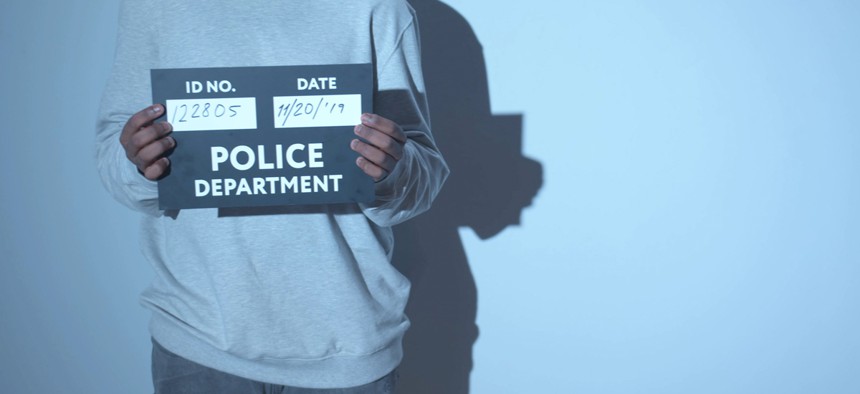'A Virtual Scarlet Letter': State Bill Would Restrict Release of Mugshots

Mugshots are often placed in photo galleries on newspaper and TV websites. Shutterstock
The Utah proposal would prohibit distributing the photos unless a person is convicted of a crime, a change proponents say is needed to protect privacy in the digital age.
Mugshots would not become public in Utah unless the person in them is convicted of a crime, under a bill advancing through the state legislature.
The photos, taken during the jail booking process whenever a suspect is taken into custody, are typically made public right away and are often posted in galleries on newspaper and television station websites. But many of the people depicted in the photos aren’t convicted, and once a mugshot is posted online, it’s impossible to erase, said Rep. Keven Stratton, a Republican from Orem and the bill’s main sponsor.
“This bill seeks to address the inequality that comes when, in today’s high-tech world, a mugshot is released based on arrest or accusation,” Stratton said Thursday at a hearing of the House Law Enforcement and Criminal Justice Committee. “The reality is today, in doing so, we hang a virtual scarlet letter around the one that’s been accused or arrested that, indeed, has a constitutional opportunity and right to be presumed as innocent until proven guilty.”
Distributing law enforcement photos of suspects who are never convicted is tantamount to cruel and unusual punishment, Stratton said, which is prohibited under Utah’s constitution.
As written, the bill would make jail booking photographs “protected records” that can be disseminated publicly only if “the individual is convicted of a criminal offense.”
Mugshots could also be released if the person in the photo is a fugitive, or a threat to others or to public safety in general, or if releasing the image would “assist in apprehending the individual.” Judges could also order that individual mugshots be released if doing so “is in furtherance of a legitimate law enforcement interest.”
Several attorneys spoke in favor of the bill, including Utah County Attorney David Leavitt, who said he’d seen firsthand the damage a leaked mugshot can cause. Years ago, Leavitt said, he defended a dentist who was taken into custody when his assistant called the police after a young patient experienced pain during a routine dental procedure.
“He had his mugshot taken and he was on the 10 p.m. news,” Leavitt said. “When the case came to my office ... it was declined for prosecution. But if you Google that dentist’s name on the internet today, you’ll see a mugshot, despite the fact that he was never charged, let alone convicted.”
Leavitt said he and Stratton had worked with law enforcement agencies on the legislation to ensure proper exceptions for distribution of the photos in cases that warrant it.
“We simply believe in today’s world that someone presumed innocent should not have their mugshot distributed worldwide for the rest of their lives on the internet,” he said. “We believe that’s the worst punishment someone could get and, in fact, it is cruel and unusual punishment.”
Several media representatives testified in opposition to the proposal, including Nate Carlisle, an investigative producer and reporter for Fox 13 Utah and a member of the Utah Media Coalition. Media outlets have been regulating their own usage of mugshots for years, he said, and would prefer to work with legislators to revamp their current policies rather than be subjected to broad government regulation.
“We do not publish every mugshot. We never have. We do not report on every crime. We never have,” he said. “We are judicious about this, and we are open to reevaluating this … but that doesn’t mean we should be sealing off mugshots from public access.”
The committee unanimously approved the bill. It goes next to the House for floor debate.
Kate Elizabeth Queram is a staff correspondent for Route Fifty and is based in Washington, D.C.





